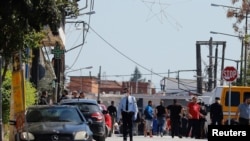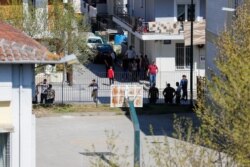Greek health officials have quarantined one of the country’s biggest Gypsy, or Roma, camps, scrambling to contain the spread of the coronavirus after multiple cases were detected there.
The squalid settlement of 3,000 on the outskirts of the city of Larissa, 216 kilometers north of Athens, was locked down after at least 20 residents tested positive for the contagious virus late Thursday.
Dozens more have since been recorded as authorities launched sweeping tests over the weekend, also keeping the military on standby to step in and enforce the quarantine in a bid to stop the virus from spreading to neighboring communities.
“This incident has confirmed our greatest fear,” said Apostolos Kalogiannis, the mayor of Larissa, which, along with neighboring towns has until recently boasted a limited number of COVID-19 infections.
All cases in the Roma settlement of Nea Smyrni have been linked to a 32-year-old man believed to have defied nationwide stay-home orders. He is also believed to have interacted with migrants at a nearby camp, forcing authorities to also quarantine that camp, 15 kilometers from Larissa, for two weeks.
Health and security officials Friday scrambled to the Roma settlement to assess the situation, concerned the outbreak could imperil the government’s successful drive to bring the coronavirus to heel, after convincing the country's population to heed draconian lockdown orders.
The situation in this case “is different and difficult,” warned Sotiris Tsiodras, an infectious diseases expert and the head of the Greek medical response team. “The example of Larissa shows just how fragile the situation is,” he said, refusing to elaborate.
As the COVID-19 pandemic rages across Europe, Roma, traditionally crammed in decrepit homes and settlements with poor sewage, are largely being viewed as ticking time bombs, generating 20 new cases for every infected person, seven times as fast as the average rate of virus’s infection, according to experts.
Government officials contacted by VOA in Athens Friday said the administration was set to use “any and every necessary measure” to avoid further spread of the virus across Larissa, a largely agrarian area.
The latest outbreak provides a revealing glimpse of how vulnerable and neglected Roma communities remain across Greece and Europe generally.
Up to 12 million Roma live in Europe, but their communities from the Czech Republic, Hungary and Slovakia to Bulgaria, Romania, Kosovo, and Serbia, face decades of neglect.
Stuck in slums and overcrowded neighborhoods, governments have long refused to formalize their settlements and provide basic services. Worse yet, critics add, authorities are now opting for aggressive tactics rather than aid and development plans to improve Roma communities.
Abel Ravasz, the Slovakian government's former emissary for the Roma communities, said the use of the military to enforce a lockdown order on affected communities would only further stigmatize the Roma.
In the Bulgarian town of Sliven, police set up checkpoints around a Roma enclave earlier this week, restricting movements. Since then, police have moved to cordon off three other settlements, citing what they called traditional Roma defiance of rules and social distancing.
“I would say that coercion is needed in certain situations because we are obliged to protect the rest of the population,” Interior Minister Mladen Marinov said.
Nationalist European lawmakers, meanwhile, have called for sweeping shutdowns of Roma “ghettos,” labeling them breeding grounds for the coronavirus spread. The racial slurs have since then been picked up, posted and embellished by thousands of Greeks on social media accounts, sparking nationwide debate.
To prevent further stigmatization, Greek officials, led by Tsiodras, lost no time in meeting with senior Roma leaders and community members at the Nea Smyrni settlement.
We are all brothers in this country,” he told an open assembly of locals, after the talks on Friday. “But you have to follow the measures. You have to practice social distancing.”
The crowd cheered but as the team left, groups of Roma were seen following the health chief and his team, asking why they had neglected them for so long.
Since the outbreak of the coronavirus, Greece has documented 92 deaths and nearly 2,000 cases, a stark contrast to the more than 17,000 fatalities in neighboring Italy.





